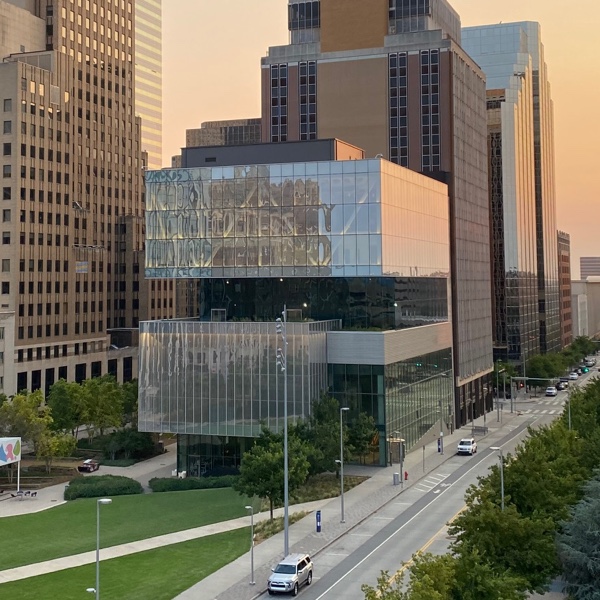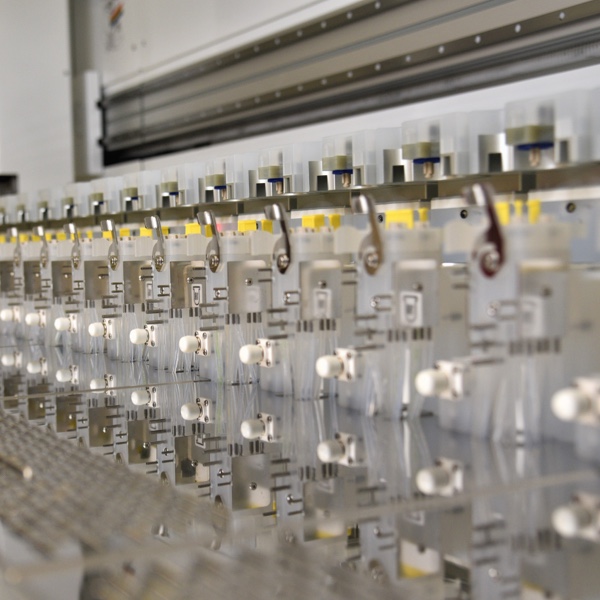Capabilities
Oklahoma City Development Center
Wheeler’s Oklahoma City Development Center features our OU Research Park facility and state-of-the-art headquarters, The Ziggurat. As an anchor tenant in the OKC Innovation District, Wheeler is excited to be a part of Oklahoma City’s robust academic, clinical, and biotech ecosystem.
Wheeler is currently building a “Facility of the Future”, which will be available in 2023. With 35,000 square feet of drug substance manufacturing capacity, featuring ballroom production suites (closed processes), cell banking, on-site media and buffer prep, on-site QC labs, development labs, digital systems integrations with a PIP-friendly floor plan, Wheeler’s Facility of the Future is designed to be highly flexible and accommodating of a variety of biologics.
Wheeler offers flexible protein expression services and continually works to improve our enabling tools. Our CHO-based transient expression system, delivering milligram to gram quantities of recombinant proteins from a CMC-relevant genetic background, often marks the first time that customers migrate to CHO in the discovery workflow — and away from HEK293 or some other transient expression system. We use transient expression in CHO to rapidly screen molecular formats of the target protein, with the data being cycled back for further vector engineering (in our Boston R&D Center) to improve the final outcome.
We offer mammalian cell line development (CLD) services from our state-of-the-art Oklahoma City Development Center. Our facility features the entire Solentim Ecosystem, agency-vetted CHOSOURCE™ cell lines, custom expression vectors, a transposon-mediated gene delivery system, Ambr® 15, Ambr® 250, Wave ReadyToProcess 25L, BioFlo 320, ÄKTA avant, and extensive protein analytics.
The Solentim Ecosystem allows for rapid single-cell isolation from stable pools, in-well assurance of single-cell isolation, low-pressure seeding with high-efficiency plating, and confidence in clonally-driven outgrowth. In addition, whole-well, high-contrast imaging of the media-filled wells to confirm the presence of a single cell at day 0 offers a second level of assurance of clonality.
The Ambr® technologies allow for high throughput clone screening and manufacturability assessments of presumptive stable clones in well-controlled, fed-batch cell culture formats.
The Wave, BioFlo and ÄKTA technologies allow in-house scale-up and purification.
For customers looking for help using alternative CLD platforms, our CLD scientists are seasoned practitioners of a variety of industry proven cell line development products like Freedom™ CHO-S™ (Thermo), and CHOZN® (Sigma). Please contact us for custom projects.
We have a world-class development team dedicated to mammalian bioprocess design, development, characterization, and intensification. Our leadership team has worked on hundreds of drug substance processes over the last two decades spanning a wide range of process modalities such as fed-batch, perfusion, microcarriers, and fiber-cell disks and a wide range of product types such as mAbs, bsAbs, fabs, scFvs, enzymes, vaccines, fusion proteins, cytokines, plasmids and CGTx. Whether beginning from ground level or optimizing a current process or using Wheeler’s platform for mAbs (Portable CMC®), our expert process development scientists can deliver a cost-effective scalable method for drug substance preparation.
To deliver the highest level of customer experience, our investors have backed our goal of building a state-of-the-art facility with premium, brand new equipment and a bespoke workflow (Portable CMC® CDMO Selection) on top of a layer of automation (Synthace) and bioprocess modeling (DataHow), allowing rapid generation of drug substance processes with reduced risk, standardized materials, uncompromised yields, and proven scalability.
Our wide range of analytical development capabilities support your product process development activities on a continuous basis. Robust measurement systems underlie a modern QbD approach to ensure that methods for preparation of drug substance meet your requirements for safety, integrity, strength, purity, and quality (SISPQ).
Our approach to preclinical material preparation leverages scaled-down models that are proven to meet prospective CQAs. Scaled-down model evaluations provide both data and materials for preclinical testing. Our Oklahoma City Development Center features a 3,000 sq. ft. GLP-compliant protein sciences lab that gives our customers access to a scaled-down, standard method for the preparation and analysis of presumptive drug substances deriving from stable pools or clones.
-
Protein Expression Systems
-
Solentim Cell Line Development Ecosystem
-
Cell Sorting and Transfection Technologies
-
High Throughput Processing, Data Management, and Automation
-
Process and Protein Analytics
-
Incubators, Cold Chain, and Environmental Controls
-
Microscopy and Imaging

